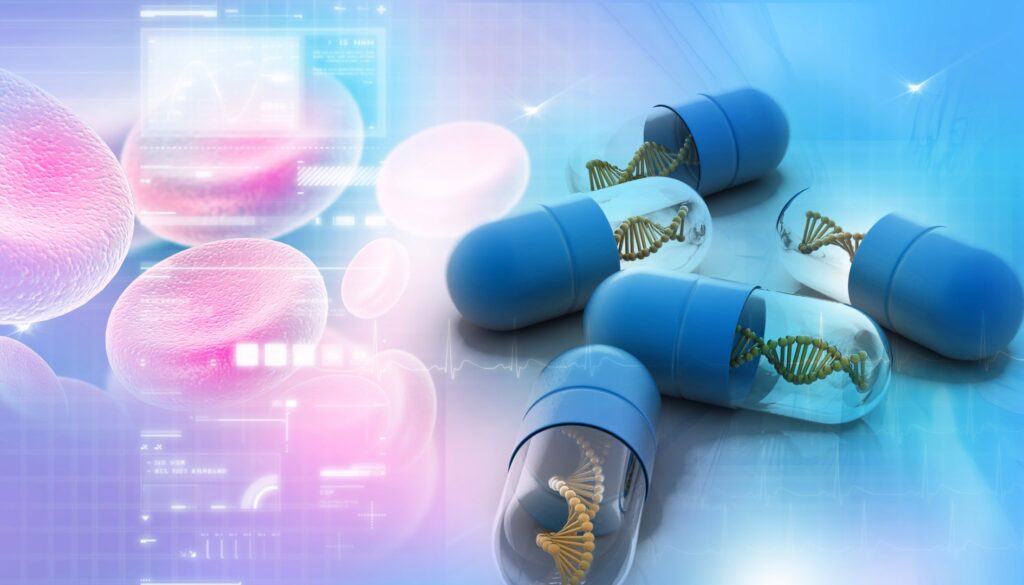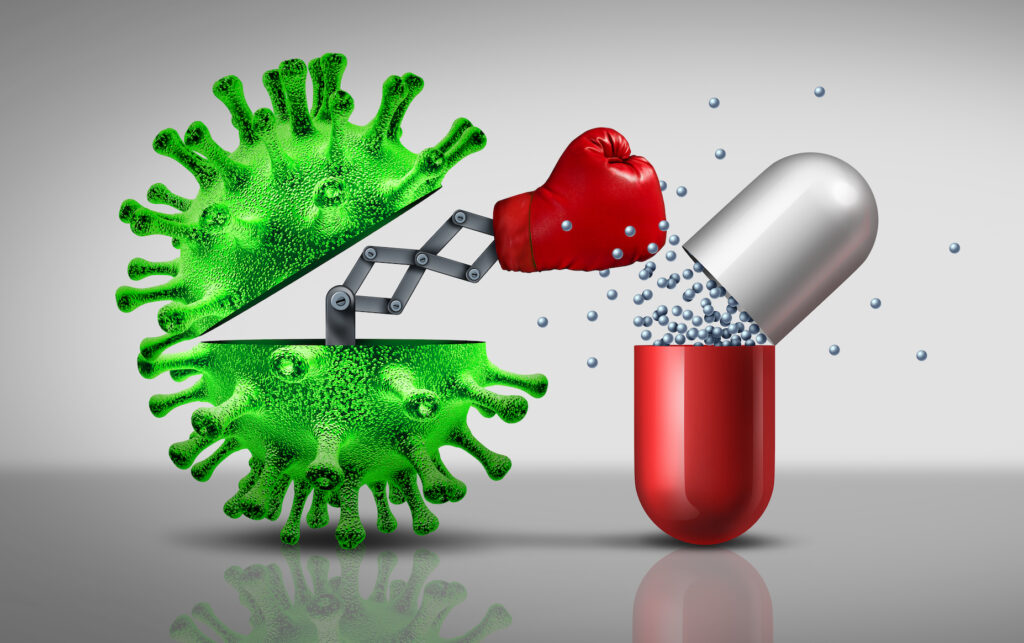Pharmacogenomics, the study of how an individual’s genetic makeup influences their response to drugs, has undergone a remarkable evolution from its roots in pharmacogenetics to the emerging field of pharmaco-omics. This blog explores the milestones and advancements that have shaped the history of pharmacogenomics, highlighting its past, present, and future implications in personalised medicine.
Origins in Pharmacogenetics
The origins of pharmacogenetics can be traced back to the 1950s when researchers first established that inter-individual differences in drug response are influenced by genetic factors. This foundational understanding laid the groundwork for exploring how genetic variability among individuals can impact their response to medications1.
Transition to Pharmaco-Omics
As research progressed, pharmacogenetics evolved into pharmacogenomics, encompassing a broader scope that integrates tools from molecular biology, statistics, and computer sciences. This transition allowed for a more comprehensive assessment of genetic variants affecting drug responses and paved the way for multi-dimensional omics datasets to enhance our understanding of gene-drug interactions4.
Milestones in Pharmacogenomics Methodology
- Genetic Basis of Drug Responses: Early research identified genetic determinants that modify drug responses, emphasizing the impact of genetic variants on drug absorption, distribution, metabolism, and excretion (ADME).
- Technological Progress: Advances in technology enabled a deeper exploration of pharmacological variants, expanding our ability to assess the full extent of genetic influences on drug responses.
- Omics Datasets Integration: Multi-dimensional omics datasets have revolutionized the identification and mechanistic understanding of gene-drug interactions, offering insights into personalized medicine applications4.
Future Directions and Diversity
Emphasizing the importance of increased diversity in pharmacogenomic studies is crucial for paving the way towards clinical implementation. By characterizing genetic diversity across populations and ancestral groups, researchers aim to enhance personalized medicine approaches tailored to individual genetic backgrounds4.
Clinical Significance and Precision Medicine
Pharmacogenomics plays a pivotal role in personalized medicine by tailoring medical treatments based on an individual’s genetic profile. Understanding gene-drug interactions can optimize treatment outcomes by adjusting drug dosage, efficacy, and minimizing adverse reactions4.
In conclusion, the journey from pharmacogenetics to pharmaco-omics represents a transformative shift in how we approach drug responses based on genetic variability. By leveraging advancements in genomics and technology, pharmacogenomics continues to shape the landscape of personalized medicine, offering tailored treatments that optimize patient outcomes and pave the way for precision healthcare.
What is the difference between pharmacogenetics and pharmacogenomics ?
Difference Between Pharmacogenetics and Pharmacogenomics
Pharmacogenetics and pharmacogenomics are integral fields in personalised medicine, focusing on how genetic makeup influences an individual’s response to medications. While both disciplines share similarities, they have distinct focuses and scopes:
1. Pharmacogenetics:
Definition: Pharmacogenetics studies how variations in single genes impact an individual’s response to specific drugs.
Scope: It delves into the genetic variations that affect drug metabolism, absorption, and effectiveness, guiding healthcare providers in selecting appropriate treatments and dosages tailored to a patient’s genetic profile.
Examples: Identifying genetic variations can help in choosing the most suitable drug treatment and dose for a patient based on their genetic makeup[2].
2. Pharmacogenomics:
Definition: Pharmacogenomics explores how an individual’s entire genome influences their response to medications.
Scope: It takes a broader view by examining multiple genes associated with drug response variability, allowing for more comprehensive and personalized treatment plans.
-Role in Drug Development: Pharmacogenomics plays a crucial role in drug research and development by understanding how entire genomes react to medications, enabling pharmaceutical companies to design drugs with broader patient demographics in mind[5].
How has the use of pharmacogenomic testing impacted drug development and approval ?
The use of pharmacogenomic testing has significantly impacted drug development and approval in several ways:
- Drug Safety and Efficacy: Pharmacogenomics can predict the safety and efficacy of a drug based on an individual’s genetic makeup, reducing the risk of adverse reactions and increasing the likelihood of a successful treatment outcome.
- Personalized Medicine: By tailoring drug treatments to an individual’s genetic profile, pharmacogenomics enables personalized medicine approaches, optimizing patient outcomes and minimizing adverse reactions.
- Drug Development Costs: Pharmacogenomics can reduce the cost of drug development by identifying potential drug-gene interactions early in the process, leading to more efficient clinical trials and a higher likelihood of drug approval.
- Regulatory Guidelines: The FDA has provided guidelines for submitting pharmacogenetic test data as part of drug development, encouraging the use of pharmacogenomics in drug development and approval processes.
- Market Expansion: Pharmacogenomics can help expand the market for drugs by identifying subpopulations that may benefit from specific treatments, leading to more targeted and effective therapies.
- Drug Target Identification: Pharmacogenomics plays a crucial role in drug target identification and characterization, ensuring that drugs are developed to interact with the most relevant genes and proteins involved in disease pathways.
- Phase I Clinical Trials: Pharmacogenomics can be used in patient selection for Phase I clinical trials, helping to identify inclusion and exclusion criteria based on genetic factor.
- Dose Range Selection: Pharmacogenomics can guide dose range selection by considering genetic variations that affect drug metabolism and response, leading to more effective and safer treatments.
- In Vitro Methods: Pharmacogenomics can be used in conjunction with in vitro methods to identify drug metabolism by polymorphic enzymes, allowing for more targeted drug development and clinical trial design.
- FDA Encouragement: The FDA encourages the submission of pharmacogenetic data to support the safety and efficacy of drug compounds, fostering the integration of pharmacogenomics into drug development and approval processes
CONCLUSION :
In conclusion, the evolution from pharmacogenetics to pharmacogenomics represents a significant paradigm shift in personalised medicine, offering tailored drug treatments based on individual genetic profiles. While pharmacogenetics focuses on single gene variations, pharmacogenomics examines the broader genomic landscape, paving the way for more comprehensive and personalised treatment strategies. By leveraging advancements in genomics and technology, pharmacogenomics continues to revolutionise drug development and approval processes, ultimately optimising patient outcomes and advancing precision healthcare.
Sources:
- ScienceDirect – From pharmacogenetics to pharmaco-omics: Milestones and Future Directions
- News-Medical – Pharmacogenetics: Past, Present and Future
- Nature – Pharmacogenomic Implications of the Evolutionary History of Infectious Diseases
- NCBI – From Pharmacogenetics to Pharmaco-Omics: Milestones and Future Directions
Citations:
[1] https://my.clevelandclinic.org/health/articles/pharmacogenomics
[2] https://clarityxdna.com/blog/learn/pharmacogenetics-vs-pharmacogenomics-whats-the-difference/
[4] https://www.ncbi.nlm.nih.gov/pmc/articles/PMC2014592/
[5] https://www.plslab.com/blog/pharmacogenetics-vs-pharmacogenomics-insights




